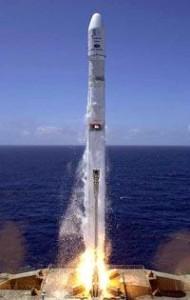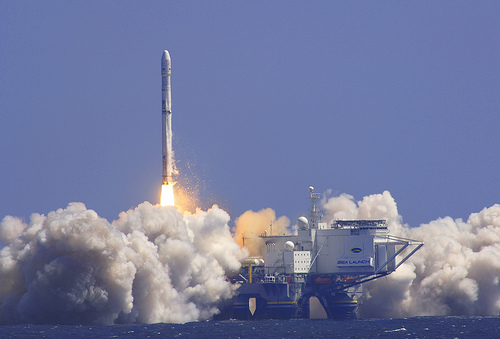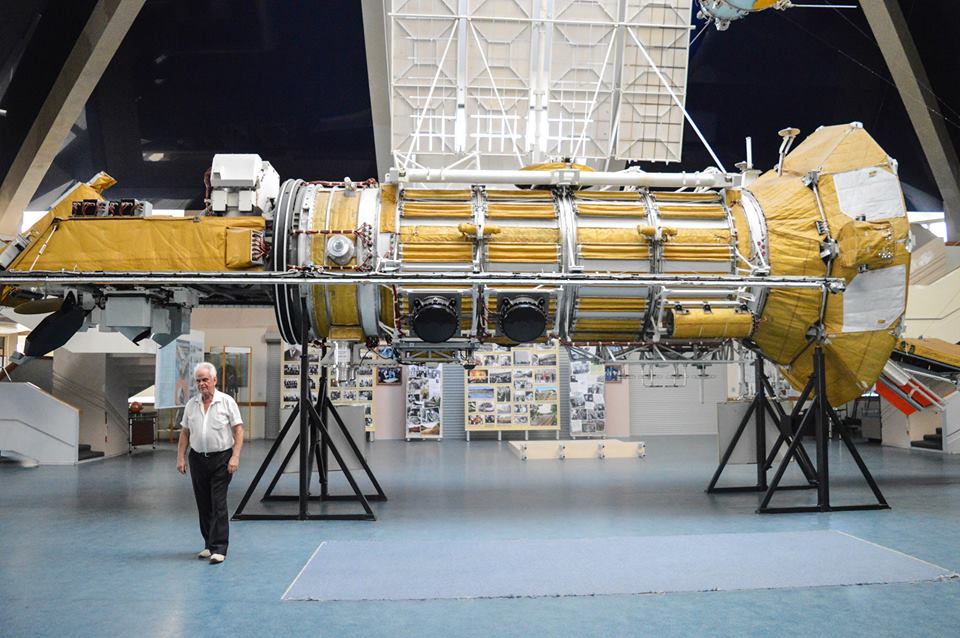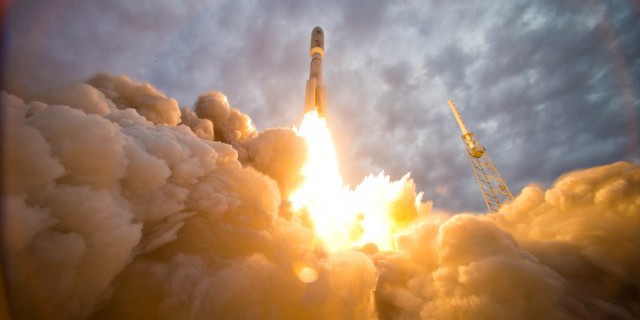by Vitalii Usenko and Dmytro Usenko
NYON, Switzerland, May 27, 2014. Today, the Sea Launch SA has successfully launched the EUTELSAT 3B satellite from at its ocean-based Launch Platform Odyssey. This marks the completion of Sea Launch’s first mission in 2014, its third for Eutelsat, one of the world’s leading satellite operators, and its 36th mission overall. The Zenit-3SL rocket (designed by the Yuzhnoye Design Bureau, Dnipropetrovsk, Ukraine) carrying the spacecraft lifted off at 14:09:59 Pacific Daylight Time (PDT) on Monday, May 26th (21:09:59 UTC, 23:09:55 CEST) from the launch platform positioned at 154 degrees West longitude in the Pacific Ocean. - reported by Yahoo Finance - May 27, 2014
The Zenit-3SL is an expendable carrier rocket operated by Sea Launch. It is a member of the Zenit family of rockets, is designed by the Yuzhnoye Design Bureau, Dnipropertovsk, Ukraine, and is built by Pivdenmash (Yuzhmash) Machine-Building Plant, Dnipropetrovsk, Ukraine. Energia Rocket-Space-Corporation (RSC), Russia produces the Block DM-SL upper stage, whilst the payload fairing is produced by Boeing Company, USA. Launches are conducted from the Ocean Odyssey platform anchored on the equator in the Pacific Ocean. One of the members of Zenit family of rockets is Zenit-3SL. Zenit 3SL is operated by Sea Launch, California - a company owned by Russian RSC Energia (40%), Boeing Company, USA (25%), Aker Solutions, Norway (20%) and Yuzhnoye (15%). The Rocket was designed by the Yuzhnoye Design Bureau, and is constructed by Yuzhmash (Pivdenmash), both Dnipropetrovsk, Ukraine.

The Zenit-3SL Integrated Launch Vehicle (ILV) is a three-staged rocket on non-toxic propellants (liquid oxygen and kerosene RG-1) intended for injection of spacecrafts (SC) into various near-Earth orbits and escape trajectories. It is created on the basis of the Zenit-2 LV two-staged rocket originated from the Yuzhnoye Design Bureau, Dnipropetrovsk, Ukraine, upper stage (US) DM-SL elaborated by Russian Energia Rocket-Space-Corporation (RSC), and payload unit elaborated by Boeing Company, USA. The Zenit-3SL ILV operates as part of the Sea Launch rocket-space complex used by the International Company Sea Launch for providing commercial launch services. The first launch was performed on March 27, 1999. In total 29 succesful launches were carried, by April 20, 2009. From 1985 to 2009 the basic Zenit-2 LV was launched 37 times, 30 of them were successful. Besides, the improved units of its first stage were used in capacity of the strap-on boosters for Energia LV and performed successfully within two launches (in total 8 rocket units).
The Russian Proton-M rocket with an advanced satellite on board crashed outside of Kazakhstan's territory on Friday, May 15, 2014 about nine minutes after lift-off. The Express-AM4R would have been Russia’s most advanced and powerful satellite. It is not the first case of failure of Russian Proton-M rocket. A Russian Proton-M rocket carrying three GLONASS navigation satellites crashed soon after takeoff from Kazakhstan’s Baikonur cosmodrome on July 2, 2013. All other launches of Proton-type rockets will be halted at Baikonur space center in Kazakhstan until the reason for the crash is determined.

As the Zenit-3SL project is far more promising then Proton-M, the Russian government would like a take closer look at the idea of buying commercial launch services provider Sea Launch, which is owned by a top Russian space contractor but whose key assets are based in California, Russia’s Deputy Prime Minister Dmitry Rogozin said Feb. 19, 2014. These plans can be changed due to current political situation.
Russia envisioned a different way of Ukraine’s development during Yanukovych Presidency: back to totalitarianism under Russian control, with technical restructuring of the Ukrainian defense industry to cover the needs outlined in Russian State Program of arms development for 2011-2020. The Ukrainian defense industry’s contribution to the program was expected to grow from 10% in 2013 up to 40% in 2020. Russia was expected to invest more than USD 700 billions into the arms program in 2011-2020. The bulk of Russian USD 15 billion credit to Ukraine was most probably conditioned on restructuring Ukraine’s defense industry and paying for Russian gas. Some experts consider the contribution of Ukraine’s military-industrial complex to Russian defense as critical in such areas as air-space defense, strategic missiles forces and navy.
Due to current political situation reorientation of the Ukrainian space and missiles industry towards US and EU projects can be essential to compensate huge losses related to stop of co-operation with Russia in defense industry. Participation in US and EU projects could reduce Ukraine’s dependence on Russia while allowing Ukraine to retain its high-tech military potential by having access to the EU and US markets.
Some experts asked if US and EU are willing or able to provide a sort of ‘Marshall Plan’ for Ukraine? Are they ready to have one more strong player at the international armaments market and integrate this player with the US and EU defense industries?
There are huge industrial capacities in Eastern and Southern Ukraine which are in urgent need of restructuring. It is essential that the restructuring be in compliance with EU technical standards. In order to achieve this, a large-scale financial assistance program, as well as a technical assistance program for Ukraine, are vital. You can not just close these industries, as they provide hundreds of thousands of jobs. To close them would result in a dangerous and unpredictable social upheaval that could lead to the disintegration of Ukraine.
Another threat to US and Europe if defense industry of Ukraine will not be integrated with US and EU industries is brain drain of key specialists together with technologies to Russia. Putin is trying to lure Ukraine’s defense industry specialists to Russia. Failure to support Ukraine’s defense industry, and Pivdenmash in particular, could result in a brain-drain of top-notch Ukrainian defense industry specialists and the transfer of sensitive military technologies from Ukraine to Russia. This would allow Russia to successfully complete re-armament, despite US and EU sanctions.

The Dnipropetrovsk Oblast State Administration support reorientation of Pivdenmash to US and EU for the restoration the glory of Pivdenmash as a major space and missile-building industry, the domestic leader and once a major player in the world, PIC News reported on May 8, 2014.
Ihor Kolomoisky, the current Governor of Dnipropetrovsk Oblast, and Serhiy Voight, acting CEO of Pivdenmash, the southern machine-building company, have signed a memorandum of cooperation to this effect.
“Because of the situation with Russia, some of Pivdenmash’s projects and contracts were on the verge of collapse, but now the situation has been stabilized. Pivdenmash has kept its old contracts and will soon begin negotiations on new projects,” their joint statement said.
According to the memorandum, the Dnipropetrovsk Oblast State Administration will be responsible for all political issues relating to Pivdenmasn and will contribute to the establishment of a non-partisan industrial territory. The Oblast Administration will also support the unconditional fulfillment of international agreements and long-term contracts with foreign and domestic customers alike.
On its part, Pivdenmash is committed to developing the missile and space capabilities of both Dnipropetrovsk and Ukraine, participating in development programs in the oblast, and providing jobs for specialists and graduates of technical universities.
The MoC will be valid for all of 2014 and automatically renew for another three years.
The example of work on the integration of Ukrainian defense industry into EU is twinning projects. Twinning is an instrument for the cooperation between Public Administrations of EU Member States (MS) and of beneficiary countries. Beneficiaries include candidate countries and potential candidates to EU membership, as well as countries covered by the European Neighbourhood Policy.
As reported by State Space Agency of Ukraine European experts visited Dnipropetrovsk on May 12-16, 2014 in the framework of the Twinning project. The aim of the visit was to demonstrate Ukrainian space industry potential for European representatives. Sergiy Zasukha, Deputy Chairman of the SSAU and Ukrainian Twinning Project Leader, was the head of the Ukrainian Working Group while Manuel Mulero Valenzuela, Spanish Project Leader, was the head of the EU representatives delegation.
Project participants visited key Ukrainian space enterprises and organizations such as M.K. Yangel SDO ‘Pivdenne’ (“Yuzhnoye’), O.M. Makarov ‘Pivdenmash’ (‘Yuzhmash’) Plant, the National Aerospace Educational Center of Youth and SPF “Dneprotechservice”. Ukrainian part made European experts familiar with designation and main activities of the mentioned enterprises and showed the presentations about international projects they are involved in.
Besides, European experts had an opportunity to see rocket space technique production, testing facilities and the main products of the companies (launch-vehicles, spacecrafts and their components, engines, aggregates, launch systems and technical complexes).
Both EU and Ukraine are sure that co-operation in the area of space and missiles industry will be successfully continued.
Written by: Dr. Vitalii Usenko, MD, MBA, expert of the Center of Military-Political Studies in the sphere of psychology of communications, and by Dmytro Usenko, student at Rotman School of Management, University of Toronto





